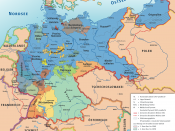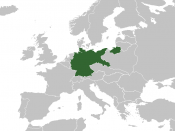The Weimar Republic was beset with serious problems from the outset that led many Germans either to withhold support from the new parliamentary democracy or to seek actively to destroy it. The extreme left and much of the right provided the republic's most vitriolic opponents. Its supporters included the bulk of the left, represented by the SPD, and the moderate right, made up of the Center Party and the DDP. However, at key times these supporters failed to behave responsibly because of political inexperience, narrow self-interest, or unrealistic party programs.
The most serious obstacle the new republic faced was the refusal of many Germans to accept its legitimacy. The extreme left regarded it as an instrument of the propertied to prevent revolution, recalling Ebert's agreement with the military in November 1918 that resulted in the army's bloody suppression of the left-wing revolts of late 1918 and early 1919. In the face of this SPD-military alliance, elements of the left considered the SPD as great a barrier to their goals as the conservatives.
Represented by the Communist Party of Germany (Kommunistische Partei Deutschlands--KPD), the extreme left felt such an enduring hostility to the Weimar Republic that at times it cooperated with the extreme right in efforts to destroy the republic.
The right posed a graver threat to the Weimar Republic than did the extreme left because it enjoyed the support of most of Germany's establishment: the military, the financial elites, the state bureaucracy, the educational system, and much of the press. Unlike political parties in well-established democracies, the right-wing parties in the Reichstag could not be considered a loyal opposition because their ultimate aim was to abolish the new system of government. The right opposed democracy and desired to establish a conservative authoritarian regime. The right styled those who...


